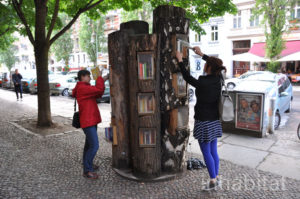I travel around a lot and I like to read. When I bought an e-Reader last year, I was delighted by the accessibility of new books while traveling light.
Soon I found myself questioning: How Green is my Kindle?
Thinking about the environmental effects of the production of the Kindle, and trying to compensate for that, I’ve sworn to myself never to buy a paper book anymore. Yeah, quite desperate… My reasoning was that I save a lot of trees if I contribute to reduction of the printing industry. In the US, 40 percent of household waste is paper. Although paper is quite a popular material for recycling, we should not forget that the fibers in paper can only be recycled up to around six times. Besides, the publishing industry specifically is largely responsible for the waste of water, and for toxic emissions during the production process.

Cleantech research then showed me something interesting. The estimated emission related to the production of a book is 7.46 kg, where the production of a Kindle is estimated at 168 kg. In the same research it is concluded that the Kindle’s CO2 produced during the full lifecycle, clearly outweighs the alternative of buying physical books during the four estimated years that a Kindle can be used to its max. Even less passionate readers will have an environmental break-even point at 22.5 books – over the entire life of the device. Reading six books a year… that should be a piece of cake for basically anyone, right?
My Kindle book-count is 13 books in about half a year time. I also got eight physical books as gift, out of which I actually read six. A few more holidays and I will be at my break even point.
Here is the book policy that I created for myself:
- I only buy eBooks.
- I make exceptions for cookbooks and artistic or graphical books. Those simply don’t work well on a Kindle.
- If a book that I want to read is not available as an eBook, I will write the publisher a short email (now I really sound obsessive but I actually did this a few times and it led to nice conversations). It unfortunately means that I will not read the book, unless it can be covered under the next point in my policy…
- So here comes my cheat: I accept gifts from people that pass on a book to me or do not know about my policy. I am afraid that after this blog the amount of gifts will reduce though.
Although I have switched to digital reading, I understand people who will say that traditional books are simply irreplacable. The rustle of flapping a piece of paper, the familiar smell of dust, the physical thrill of turning the pages… I totally get it, the reading experience is different with a real book. Gosh, I will actually miss that too if people will not give me book gifts anymore.
Anyhow… if the footprint of a book could be divided over the total count of different readers, shouldn´t the whole Kindle comparison be revised? I guess starting to visit the library again would fit my profile since I hardly ever read a book twice. Somehow the library really left my system ages ago (where did that happen?). Another great form of book exchange is using street book storages. If you have finished a book, you drop it in a shelve in the street for someone else to take and read. You can also pick a new book for yourself if you want. Entirely community-driven, socially responsbile and definitely waste reducing. If you want to drop some books, check out this stunning book carrying tree in Prenzlauerberg.

(photo credits: inhabitat)
Do you know other places in Berlin where you can drop a book in the street? And what do you think, is it better to read from a Kindle or should we keep on buying physical books? Let me know!
- Bring Your Own Bag - November 7, 2016
- Make an anti-wishlist - September 18, 2016
- Zero Waste Ice Cream - September 3, 2016

nice comments 🙂
But when it comes to the ABC method (https://www.briantracy.com/blog/leadership-success/practice-the-abc-method/
the CO2 savings are < 0,1% of your daily footprint.
🙂
I personally enjoy te aspect of light travelling with my kobo (not kindle ;)). Thanks for the figures, that´s very good to know!
Another advantage of the Kindle that has less to do with the environment.. You can buy the book you want anytime anyplace! Does save you going to the bookstore by bus/car 🙂
There are lists of public book boxes in Wikipedia.
Berlin: https://de.wikipedia.org/wiki/Liste_%C3%B6ffentlicher_B%C3%BCcherschr%C3%A4nke_in_Berlin
Germany: https://de.wikipedia.org/wiki/Liste_%C3%B6ffentlicher_B%C3%BCcherschr%C3%A4nke_in_Deutschland
Check it out!